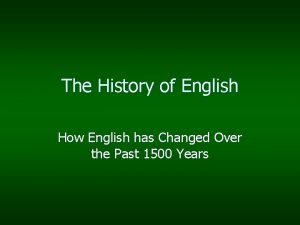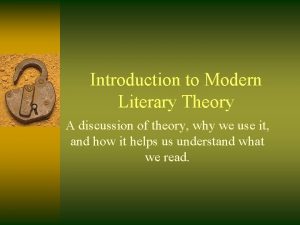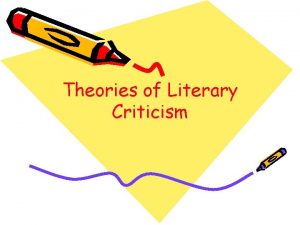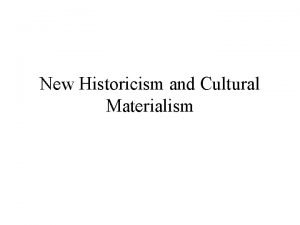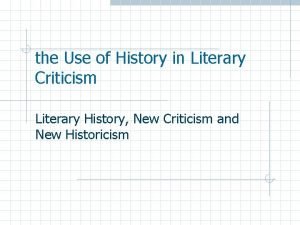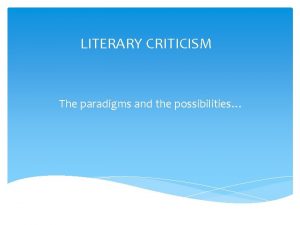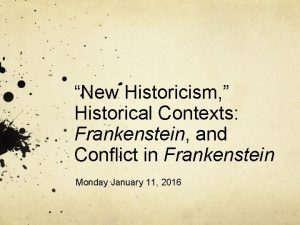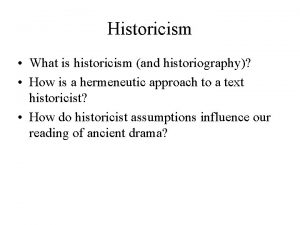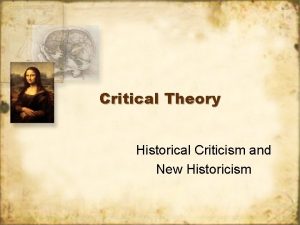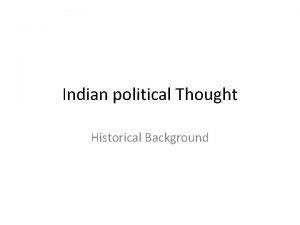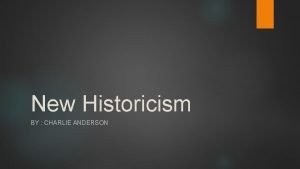German Historical Thought I Historicism HISTORICAL PROGRESS What












- Slides: 12

German Historical Thought I: Historicism

HISTORICAL PROGRESS What is Enlightenment? (Essay, 1784) Immanuel Kant, 1724 -1804

‘Enlightenment is mankind’s exit from selfincurred immaturity. Immaturity is the inability to make use of one’s own understanding without the guidance of another. Sapere aude! (Dare to know, to use your own understanding!) This is the motto of the enlightenment. ’ (From: Immanuel Kant, ‘An Answer to the Question: What is Enlightenment? ’ Berlinerische Monatsschrift (1784): 481 -494, 481. )

In memory of the countless men, women and children of all creeds of nations or races who fell victim of the fascist and communist belief in the Laws of Historical Destiny. Karl Popper, The Poverty of Historicism, 1957.


Romanticism; Romantic period): intellectual, artistic, and literary movement in Europe towards end of 18 th century - ca. 1850). It was partly a reaction to the changes related to the Industrial Revolution (e. g. scientific rationalisation of nature) but also a turning against the social and political norms of the Enlightenment. The Romantic movement considered strong emotion – particularly in confronting nature - as an authentic source of aesthetic experience (e. g. Johann Wolfgang von Goethe, The Sorrows of Young Werther, 1774) Caspar David Friedrich (1774 -1840)

• Rejection of Enlightened Ideas of History • Human nature is not universal and stays the same • Civilisation develops in stages that are not connected and lead to a highest stage of Enlightenment • Human nature can be investigated and understood by the empirical method (see Hume slide) • Rejection of natural law • Rejection of rationalisation/mechanismation of society

Def. Historicism historicism means ‘the fundamental historisation of all our thinking about mankind, its culture and values. What does it mean to historicise thinking? To historizise our thinking means to recognize that everything in the human world – culture, values, institutions, practices, (concepts such as) rationality – is made by history, so that nothing has an eternal form, permanent essence or constant identity which transcends historical change. The historicist holds, therefore, that the essence, identity or nature of everything in the human world is made by history, so that it is entirely the product of the particular historical process that brought it into being. ’ (Beiser, The German Historicist Tradition, p. 2)

‘There is no such things as a specially favored nation on earth…there cannot, therefore be any order of rank…The Negro is as much entitled to think the white man degenerate as the white man thinks of the Negro as the black beast. . . Least of all must we think of European culture as the universal standard of human values. …only a real misanthrope could regard European culture as the universal condition of our species. The culture of man is not the culture of the European; it manifests itself according to place and time in every people. ’ äNo other person has the right to constrain me to feel as he does, nor the power to impart to me his mode of perception. No other person, can in short, transform my existence and identity into his. ’ Heimat: the most complicated German word ever as it has no English equivalent. It denotes the relationship of a human being toward a certain spatial social unit. It is often expressed with such terms as ‘home’ or ’homeland’. A place of belonging which extends into the past. Volksgeist, spirit of the people, a nation expressed infused and expressed through language of a people Humanität

Yet another Philosophy of History for the Education of Humanity: Contribution to the Many Contributions of the Century (1774) Central themes of historicism: • the past should not be judged by the standards of the present • each culture is individual and a unique whole • each age has its own standards of happiness and virtue • that the past should be relived and felt rather than just described and explained through empirical evidence from the sources

• Writes against: • Present again, the Age of the Enlightenment, is the highest stage of humanity because mankind has finally reclaimed the power to direct its own fate according to the guidance of reason. • The growth of the arts and sciences since the Renaissance has improved the morals of mankind; good history teaches how we became moral; moral examples • Middle Ages was a time of darkness, where the use of reason was trampled by ecclesiastic authority, and where belief in relevation spread superstition and prejudice. • inspiration for the age of Enlightenment was Antiquity (Roman Republic; 5 th century Athens) and civilisaton needs to return to this age and to imitate this age

What does he believe? • No single standard of happiness • Do not judge people and cultures • Do not judge history by moral standards • Do not judge earlier developments of mankind by later ones • Cultures cannot be understood by laws alone but need to be ‘understand’ cultures by feeling our way into it • ‘… go into the age, in the region, and the entire history, feel yourself into it – only then are you on the way to understand the (general) word. ’ • Providence; not all we do can be know by empirical evidence; there is God’s plan
 Low german vs high german
Low german vs high german Physical progress and financial progress
Physical progress and financial progress Incomplete thought
Incomplete thought Advantages and disadvantages of marxism
Advantages and disadvantages of marxism Formalist theory in literature
Formalist theory in literature New historicism frankenstein
New historicism frankenstein Difference between new historicism and cultural materialism
Difference between new historicism and cultural materialism New historicism definition
New historicism definition New historicism literary theory
New historicism literary theory New historicism literary theory
New historicism literary theory New historicism examples
New historicism examples New historicism
New historicism New historicism literary theory
New historicism literary theory
